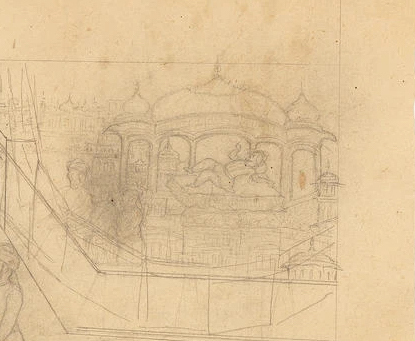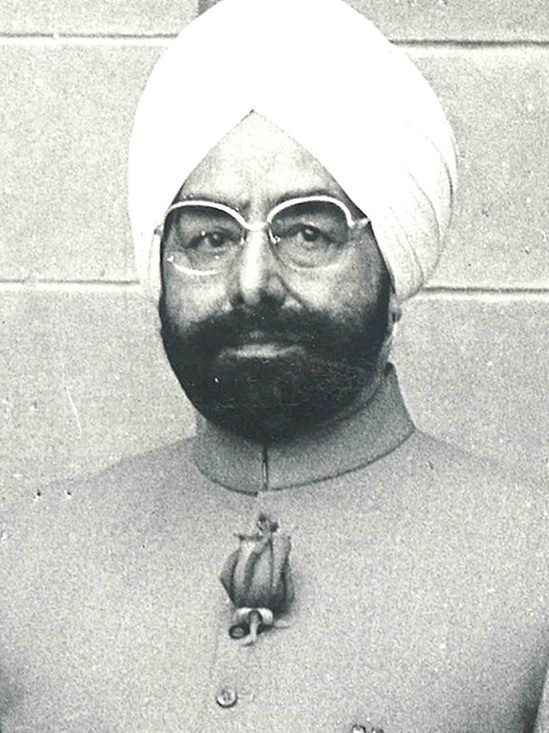BIJAYBINOD, a chronicle in Punjabi verse of the turbulent period following the death in 1839 of Maharaja Ranjit Singh, the sovereign of the Punjab, written according to internal evidence in 1901 Bk/AD 1844. The only known manuscript of the work, still unpublished, is preserved in the private collection of Bhai Haridhan Singh of Bagariari. The manuscript, which comprises 84 folios, with 495 stanzas, is dated 1921 Bk/AD 1864. The poetic metres used include Dohara, Soratha, Bhujarig Prayat and Kabitt. The work was undertaken by the poet, Gval, at the instance of Pandit Jalha, a close confidant of Hira Singh Dogra, prime minister to Ranjit Singh`s son, Maharaja Duleep Singh, and that explains much of his bias in favour of the Dogras.
Explore Yahiya Khan's tumultuous reign as Lahore's governor, the Chhota Ghallughara, and the power struggle with his brother in 18th century Punjab.
CHIRAGH DIN, FAQlR (d. 1851). son of Faqir Aziz udDin, foreign minister to Maharaja Ranjit Singh, was governor of Jasrota. a small principality in the Sivalik hills, and was shortly afterwards placed in attendance on Prince Kharak Singh. In 1842, he succeeded his brother, Shah Din, as the Sikh ruler`s envoy (vakil) at Firozpur and continued in the same position with the Council of Regency formed after the first Anglo Sikh war under the treaty of Lahore of 16 December 1846. Chiragh Din had five sons, the eldest of whom, Siraj udDin, became the chief minister at Bahawalpur where he met with a tragic end. Chiragh Din died at Lahore in 1851.
Discover the remarkable journey of Zail Singh, the first Punjabi President of India. Learn about his roots, education, and impact on Indian history.
DEVA SINGH, SIR (1834-1890), a highranking Patiala state administrator, was born in 1834 into an Arora Sikh family, the son of Colonel Khushal Singh, a brave soldier who had once killed a tiger (sher, in Punjabi) near one of the city gates conferring upon it the name Sheranvala which lasts to this day. Deva Singh received the only formal education available at that time by attending a maktab or Persian school, and entered Patiala state service at a very early age in 1846. In 1853, he was appointed assistant judicial minister and in 1855, a Risaldar in a cavalry unit.
GIAN SINGH RAREVALA (1901-1979), administrator and politician, was born on 16 December 1901 at his mother`s village Bhari in Ludhiana district. His own ancestral village was Rara, also in Ludhiana district, where his father Ratan Singh was a bisveddr (fiefholder) of the former princely state of Patiala. Gian Singh having received his early education at Bhari, Samrala and Ludhiana, passed his matriculation examination from Model High School, Patiala, and Bachelor of Arts examination from Mohindra College, Patiala, in 1925. He then entered the Patiala state service as a ndib ndzim (assistant deputy commissioner) and after a year`s training at Patiala he was posted to Sunam.
Discover the dramatic tale of Jalla Pandit, the powerful adviser whose arrogance led to his downfall in the Sikh Kingdom's tumultuous history.
Explore Jodha Ram's pivotal role in 19th century Sikh politics, including his capture and execution by Jawahar Singh. Learn about his intriguing legacy.
Explore the legacy of Jogendra Singh, a Sikh scholar and statesman, noted for his contributions to journalism and agriculture in the early 20th century.
Learn about Lal Kaul, a Kashmiri Brahman who served in Afghanistan and Sikh expeditions, becoming a key leader in 19th-century South Asian history.
- 1
- 2




